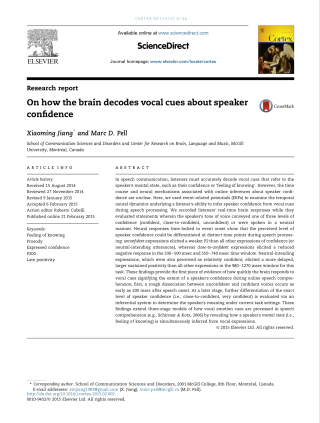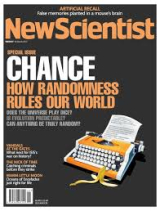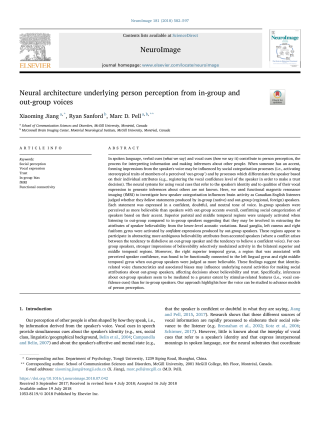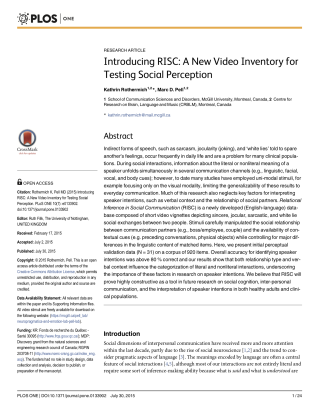On how having an accent affects trust...
Public news release (McGill University)
- Do we trust people who speak with an accent? We tend to believe speakers who sound the same as us, though much depends on their tone of voice. [K. Gombay, 13 September 2018]
Radio broadcasts/podcasts
- A tell-tale accent and a whispering voice: Identities shaped by how we sound. CBC Radio One, The Doc Project [podcast by G. Kahn, 11 Feb 2020]
- Confident tone overcomes accent distrust. Scientific American 60-Second Science. [podcast by L. Huang, 11 Oct 2018]
- What can we tell about people with an accent? The Andrew Carter Morning Show, CJAD 800 AM Radio, Montreal, Quebec [28 September 2018]
Television
- Do we distrust people with accents? CTV News at Five/CTV News at Six. CTV Montréal [by P. Karwatsky, 20 September 2018]
Print articles
 In the Realm of "Ahh": Voice and style of speech—including pesky filler words—reveal a lot about a speaker [by A. Fagan, March 2019]
In the Realm of "Ahh": Voice and style of speech—including pesky filler words—reveal a lot about a speaker [by A. Fagan, March 2019]
- Perreault, M. (2018, October 1). La méfiance face aux accents: Les gens font moins confiance aux personnes qui ont un accent. La Presse (Quebec).
- Torres, M. (2018, September 27). We trust people with accents less…unless they speak with confidence. Ladders (USA).
- Weston, P. (2018, September 18). Are we hardwired to be xenophobic? You are less likely to trust someone who speaks with an accent because humans automatically perceive them as ‘other’, scientists say. Daily Mail (UK).
On how the brain responds to vocally expressed confidence...
 Print articles
Print articles
 Confident voice? We decide in a second. No 3012, p. 17 [by P. Sarchet, March 2015]
Confident voice? We decide in a second. No 3012, p. 17 [by P. Sarchet, March 2015]
- Your brain detects confidence in voices faster than you can blink. Forbes.com. [by D. DiSalvo, 31 March 2015]
- 4 tips for grabbing the attention of your audience. Medium [by N. Lipkin, 31 Aug 2017]
On how the brain responds to vocally expressed emotions...

Public news release (McGill University)
- Human sounds convey emotions better than words do. [by K. Gombay, 18 Jan 2016]
Radio broadcast
- Human sounds convey emotions faster than words. Radio Canada International. [narrated by M. Montgomery, 2 Feb 2016]
Print articles
- Cailleau, E. (2016, February 24). Le cerveau plus attentif aux émotions cachées derrière les mots. Top Santé.
- Hotait, F-P. (2016, February 22). Nous comprenons mieux les cris et rires que les mots. Slate (France).
- Valesini, S. (2016, February 9). Con urla e risate più facile comunicare i sentimenti. Repubblica (Italy).
- Granda, J. (2016, January 21). El cerebro tarda una décima de segundo en reconocer las emociones en el tono de voz. La Vanguardia (Spain).
- Strobel, M. (2016, January 19). Science behind Sophie Gregoire-Trudeau’s ditty. Toronto Sun (Canada).
- Nauert, R. (2016, January 19). Brain processes sounds of emotions faster than words. PsychCentral.
- Griffiths, S. (2016, January 19). Why noises are worth a thousand words: we recognise laughter, grunts and growls far faster than if we use emotional words. DailyMail.com (UK).
On how people understand sarcasm and indirect meanings...
Public news release (McGill University)
- Gombay, K. (2015, November 26). How can I tell if they’re lying?
Print articles
- Low, O. (2016, March 21). Wait, was that sarcasm? Medium.
- Vulliamy, E. (2015, December 11). Can you tell when someone’s lying? Take the quiz. Independent (UK).
- Shea, M. (2015, December 1). Men aren’t very good at understanding sarcasm. AskMen.com.
- Olson, S. (2015, November 30). White lies and sarcasm tend to confuse men, people with Alzheimer’s, Parkinson’s, and Autism; Here’s why. Medical Daily.
- Ians (2015, November 29). Is that compliment on your new dress for real? According to the study, people—especially men—had difficulty identifying when someone was being sarcastic. The Indian EXPRESS.
- MacDonald, C. (2015, November 27). Can YOU spot a liar? Take the test that reveals how good you are at separating fact from fiction. Daily Mail.com (UK).
On how Parkinson's disease affects social communication...
Public news release (McGill University)
- Parkinson’s disease research uncovers social barrier. [by W. Raillant-Clark, 3 Feb 2010]
Print articles
- Davis, T. (2015, March 31). Beyond the tremors: the other challenges of living with Parkinson’s disease. Personal Health News.


